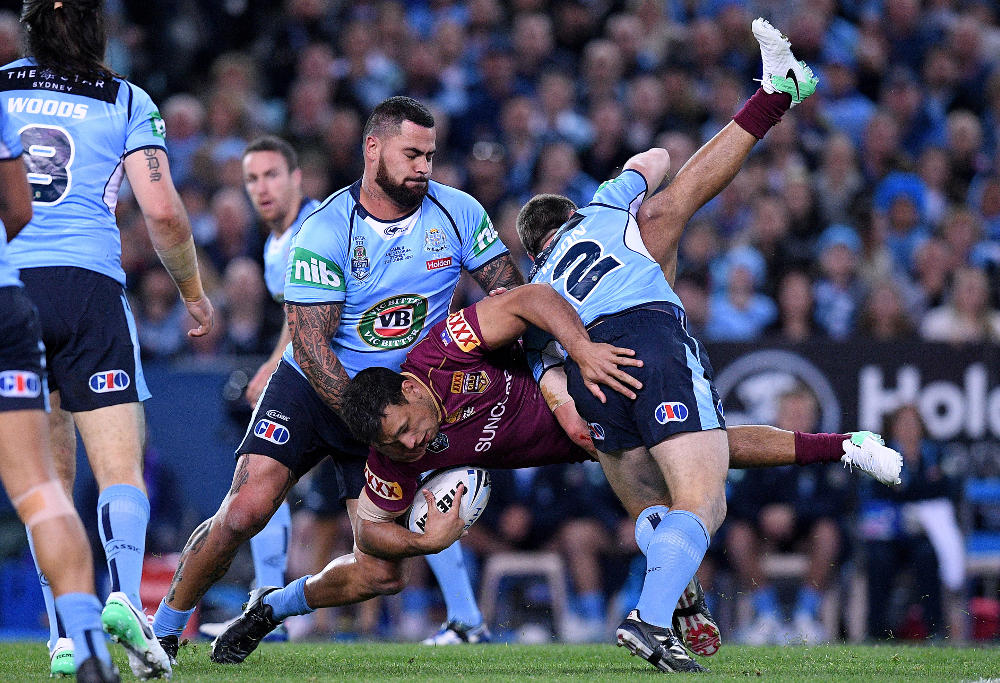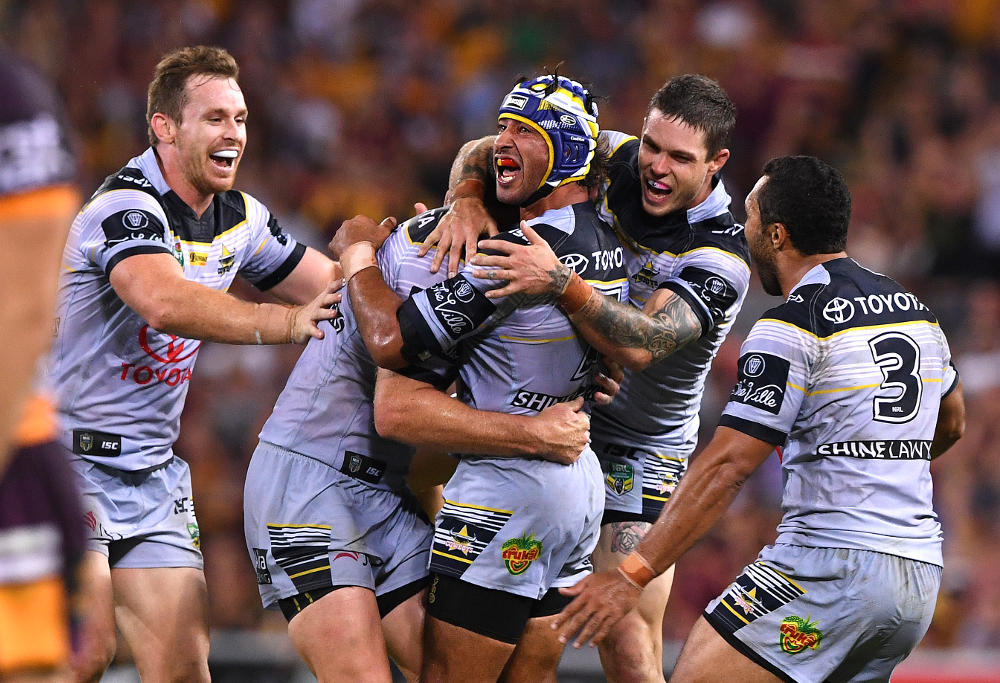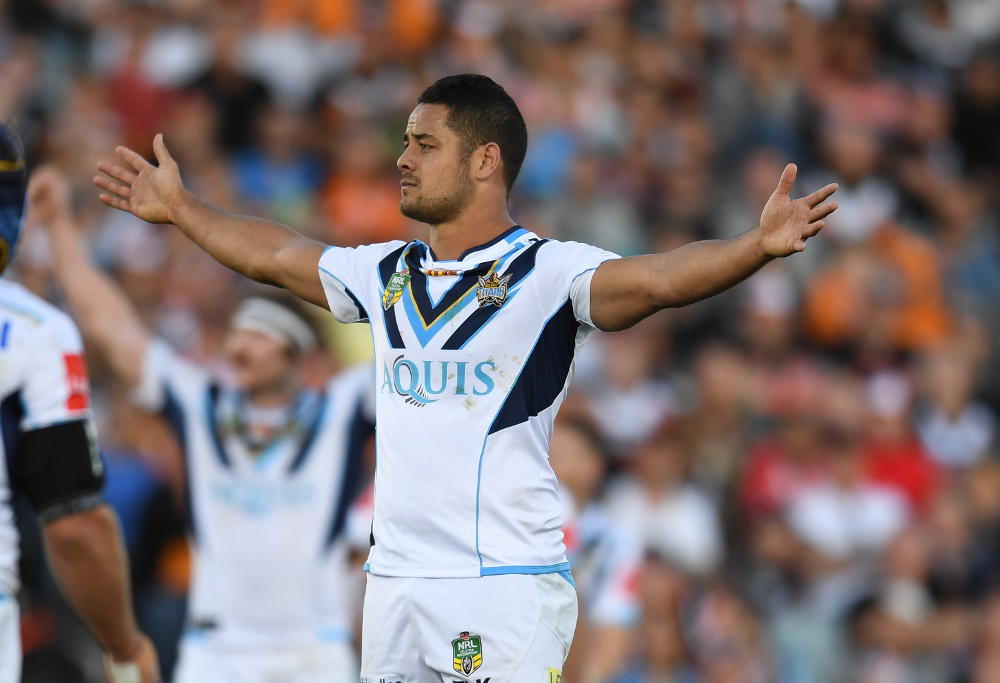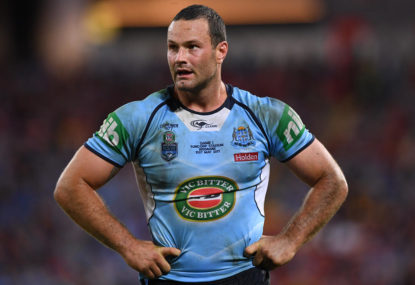I really didn’t want to be that guy. The whinger. The moaner. The sore loser. I tried to let it go and move on, but I just couldn’t come to terms with the way that New South Wales lost that game.
So instead of gracefully accepting defeat, I’m saddling my high horse and charging.
Let me preface this Rothfield rant by doffing my cap to Queensland. The Blues were the better side for the majority of Origin 2, yet the Maroons still found a way to win.
Despite staring down the barrel of a series defeat, dealing with incredible fatigue, 80,000 blue-wigged lunatics and injuries to Johnathan Thurston and Darius Boyd, Queensland kept their composure. They capitalised on their opportunities and were deserved victors.
(Tom necks a schooner of Listerine to remove the taste of bile from his throat).
I can handle the losing. As a New South Wales supporter, I’m well accustomed to failure. Along with the rest of the state, I’ve watched my beloved Blues snatch defeat from the jaws of victory on more occasions than I care to count. So it’s not the loss which bothers me.
But the way it all went down was stinkier than a pair of Julian O’Neill’s sneakers.
How? How did New South Wales manage to lose that game? How did they control the game for 60 minutes, yet still lose the match? How did they dominate so completely through the forwards, yet still concede a couple of soft tries down the stretch? How did they give up a ten-point lead in Origin with only around 25 minutes remaining?

(AAP Image/Dan Himbrechts)
I’ve got one possible explanation, but it’s out there. And I mean really out there. Think the plot of Inception meets Paul Kent winning a Gold Logie. But if you’ll indulge me, I’m going to put on my tin foil hat, summon Fox Mulder on the Ouija board, and ask the question that’s been bothering me for days. Did the NRL influence how Game 2 was officiated?
Crazy, right? But just think about it for a moment before destroying me in the comments section.
There can be little doubt that the officiating in Game 1 was vastly different to Game 2. Up at Suncorp Stadium, Matt Cecchin and Gerard Sutton let the game flow. Their whistles remained holstered despite countless indiscretions that would have been pulled up in club footy. It was a fast and furious contest, and one which clearly favoured the more mobile New South Wales forward pack.
Game 2 was officiated by the same two men, but you wouldn’t have known it based on some of their decisions. From the gust of wind that felled Billy Slater to the questionable stripping penalties against the Blues, the referees seemed more predisposed to penalise.
To compound the confusion, there was a complete lack of consistency from one decision to the next. Maloney was penalised for taking out Billy Slater, yet there was no decision against the Maroons for obstructing Hayne and Dugan, or Wade Graham for knocking Slater over later in the game. This slower, stop-start style of play suited the Queenslanders perfectly.
I know that Kevin Walters can be a convincing public speaker, but his oration on the officials prior to Game 2 was hardly Churchill delivering Blood, Toil, Tears and Sweat. Surely his comments prior to the match didn’t convince the referees to make wholesale changes to the way they operate.
So why the sudden change in refereeing style? Why would the same two referees officiate Game 1 and Game 2 so differently? Is it beyond the realms of possibility that the NRL could have asked Tony Archer to tighten things up for Game 2?
I’m not suggesting that the NRL had anything to do with the final result. That’s madness, even for a true Bluiever like myself. But it’s hard to argue against the fact that rugby league and its major stakeholders certainly had a lot to gain if the Maroons forced a series decider.
The NRL would win by having another three weeks of saturating media coverage. Merchandise sales would sky-rocket, tickets for the game would sell out, and the code would have the opportunity to promote one of the most anticipated sporting contests in Australian history. It would be a magnificent advertisement for rugby league.
Channel Nine would win by screening what will undoubtedly be the highest rating program in 2017, save for a Masterchef versus MKR cross-network culinary cage match. Advertising spaces would sell for an absolute premium during the decider, which would serve as a tidy little Bunsen burner for the struggling network.
And Origin itself would win by serving up a fairy-tale farewell for at least one member of the Queensland royal family, while reaffirming itself as the premier event on the national sporting calendar. Sorry AFL grand final.
As I said at the top, I take nothing away from the performance of the Maroons. They deserved to win that game after the Blues choked worse than Greg Norman at Augusta. But there can be no denying that Queensland’s cause was helped mightily by the manner in which the game was officiated.
Now, back to reality.
Cowboys count the cost of representative football
I feel for Johnathan Thurston. After finally succumbing to a dodgy rotator cuff, the future Immortal has been denied his 300th club game, a fairytale Origin farewell, and a final World Cup campaign for the Kangaroos. But whatever I feel for Thurston, I feel much worse for the North Queensland Cowboys.
Heading into 2017, the Cowboys were considered strong contenders. With Thurston at the peak of his powers, Jason Taumalolo coming off a Dally M-winning season, and the team assembling one of their strongest supporting casts in years, there was real reason for excitement in Townsville.
The season started well enough, with North Queensland winning four of their first six and JT looking as sharp as ever. But then, the rep season started. Club coaches’ kryptonite.
The normally durable Thurston picked up a shoulder injury during the Anzac Test and missed the next seven rounds of club football. He reappeared briefly in Round 14, before aggravating the injury in Origin 2.

(AAP Image/Dave Hunt)
In the end, Thurston only managed seven appearances for the Cowboys this season. North Queensland still has a decent side even without their inspirational captain, but they are no longer legitimate premiership contenders. Their season ended the moment that Tyson Frizell cannoned into Thurston’s shoulder.
Now, put yourself in Paul Green and the North Queensland Cowboys’ shoes. Entering the 2017 season, you know you realistically have two years left before JT retires. With your premiership window rapidly closing, you funnel all available resources into supporting your marquee player. You plan your attack around him, run your set plays through him, and rely on him to steer your team around the park.
Suddenly, due to circumstances outside your control, your season takes a dramatic twist. Instead of looking ahead to the finals, you are now faced with a million-dollar black hole in your roster, a hefty medical and rehabilitation bill, and the prospect of reshaping your entire attack on the fly.
Fairly or otherwise, your club has been punished for having players selected to play representative football.
Situations such as this one can help fans understand why NRL clubs are reluctant to allow their star players to participate in representative fixtures. We’re all quick to bag the likes of Des Hasler and Ricky Stuart for not supporting concepts like City versus Country, but why should they? What’s in it for the clubs, apart from the risk of injury?
The reality is that coaches are judged on winning football games, and this task becomes much more difficult without your star players. After what happened to the Cowboys this season, are we looking at a future where clubs refuse to release their players for Origin duty? If it was your coaching job and livelihood on the line, what would you do?
5th tackle option
Here are five quick thoughts on the action from Round 16.
1. I’m not sure how it’s humanly possible (or safe for that matter) for players to back up for their club sides only 48 hours after Origin. Their bodies go through the equivalent of the gauntlet on that old Gladiators show, except there are no pads on the ramrods and all the Gladiators are Vulcan, and yet they still front up and rarely disappoint. Simply phenomenal what the human body can endure.
2. First points go to Jarryd Hayne in his battle to retain his Origin jumper. The Gold Coast fullback was far from flawless in his team’s victory against the Tigers, but he was still the difference between the two sides. During a devastating ten-minute blitzkrieg after half-time, the magician from Minto scored two tries and set up another. Without him, the Titans may not have won the game.

(AAP Image/Brendan Esposito)
3. Ethan who? What a spectacular end to the Cowboys versus Panthers game. After Nathan Cleary was awarded a controversial try for a clear double movement, Kyle Feldt responded in acrobatic fashion with one of the finest finishes of the season. Ethan Lowe, a part-time kicker at best, then calmly slotted the match-winner from the sideline. Must be a Queensland thing.
4. Benji Marshall – playing for minimum wage this season, unsigned for next season, leading Brisbane’s charge towards the finals. Ben Hunt – playing for decent coin this season, signed for around a million bucks next season, can’t crack the Broncos starting side.
5. I understand that Newcastle are in a rebuilding phase, and are giving preference to younger players as opposed to experienced veterans, but if Trent Hodkinson plays in place of Jaelen Feeney, the Knights win that game. Feeney is out of his depth as a first-grade halfback. He consistently makes poor decisions in attack, is suspect in defence, and his general execution is not of NRL standard.
































































































